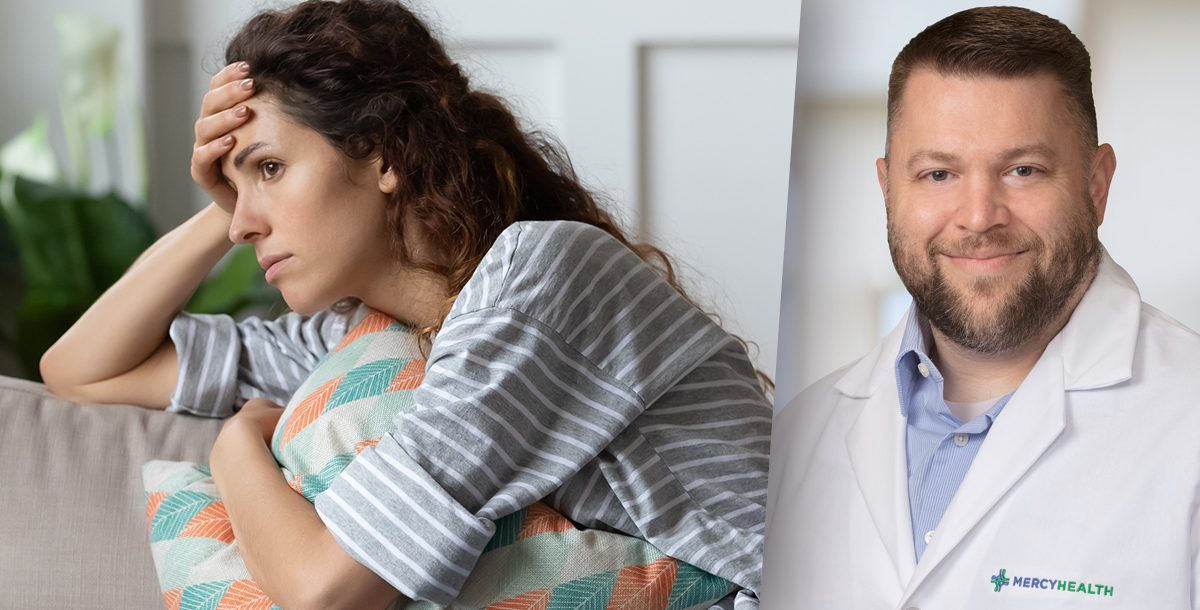May is Mental Health Awareness Month. Scott E. Reisinger, PsyD, HSP, (pictured above, right) a provider at our Mercy Health – Lorain Behavioral Health facility, has taken this opportunity to reflect on the mental health impacts from the COVID-19 pandemic and to encourage others to seek help for any ongoing issues they might be facing. Read his firsthand thoughts here.
We know from previous research on pandemics, including SARS, equine flu, ebola and H1N1 to name a few, that separation from friends and family, loss of freedom, uncertainty and feelings of helplessness negatively impact our emotional wellbeing. Add to this the financial strain experienced by so many and it becomes easier to understand why so many of us felt scared, depressed, frustrated and angry as a result of COVID-19 restrictions that were put into place.
Dealing with sudden change can often be difficult. But when that change is involuntary, it can feel unbearable.
Studies conducted specifically during the first year of the COVID-19 pandemic during stay-at-home orders and social distancing recommendations showed a clear increase in the reported incidence of anxiety, depression, insomnia and acute stress. Similarly, more general reports of fear, confusion, stress and anger were also significantly reported throughout the world.
Specifically for frontline workers, startling frequency of anxiety disorders, insomnia, stress-related health problems and exhaustion/burnout related to their jobs was revealed. Even among adults and adolescents who did not report significant anxiety or depression, many noted a sense of decreased motivation as a result of being stuck at home for an extended period while their normal routine was suspended indefinitely.
Another extremely upsetting part of this time period was the sharp increase in reports of domestic violence as well as substance use. The domestic violence was likely due to people spending more time at home with abusive partners, financial stressors and job loss increasing conflict, many shelters being closed and law enforcement officers being discouraged from making arrests during this time period. As for substance use, one study reported that about 13 percent of Americans surveyed had started or increased substance use to cope with stress or negative emotions associated with the pandemic. This is particularly concerning as substance use and mental health issues are often reciprocally related.
What has been seen in the recent studies related to COVID-19 is that children and young adults seem to have experienced a negative mental health impact more than older adults.It is thought this may be largely due to this age group being much more socially connected and sensitive to social stimuli than many older adults. Overall, as humans, we are social creatures. Our continued existence as a species has relied upon social contact and assistance.
Despite all this negativity, there have been some positive changes that have emerged as a result of our being forced to adapt to a “new normal.”
For example, telehealth, which was previously used sparingly, has become more common. This has the added benefit of expanding the ability to obtain health care, whether traditional medical care, supportive care or behavioral health care, significantly. Given the impact of the pandemic, as noted above, this is a much-needed change. We know that individuals with a pre-existing mental health condition are at an increased risk of experiencing a worsening of their symptoms and may have more difficulty coping with the stress caused by the pandemic. Having the ability to access the support and resources available from home, particularly during times when going out is not possible or viewed by the individual as potentially dangerous, may be life-changing.
One of the most important things we can do in trying to cope with all the above is to care for our mental health.
Our ability to remain resilient, adapt to changes as needed, manage our thoughts and emotions as well as seek assistance when needed is critical during this time. For many, there can be a stigma involved in speaking with a mental health professional. The truth is it takes strength to ask for help. It takes strength to be willing to invest the time and work into improving yourself.
Think of it this way: no one ever says you are weak for going to the dentist for a cleaning. So, why should caring for your mental and emotional health be any different? Being depressed or anxious isn’t a sign of weakness any more than seasonal allergies or having diabetes.
If you are worried about taking the first step to ask for mental health help, here are a few encouraging things to remember.
- Needing therapy doesn’t mean you’re crazy. The goal of therapy is simply to learn more effective ways to manage your thoughts and feelings.
- You lead the conversations. You are in charge of what you talk about and always have the right to say you don’t feel comfortable talking about something. But also, this is a safe place for you to discuss things you have never been able to talk about before.
- Things can get better. At times, it can feel like there is no hope. However, sometimes all you need is someone else to hold that hope for you and to give you the skills necessary to gain a new viewpoint.
- You are much stronger than you think. People tend to focus on the things that aren’t working. However, being able to continue daily and be here trying, even while struggling, requires strength.
- It’s OK, and even normal, to be nervous. The first appointment is usually just gathering information from you so your mental health professional can get a snapshot of an idea about what is going on and how it is impacting you. They know this may be new for you and understand.
Learn about the behavioral and mental health services we offer at Mercy Health.






